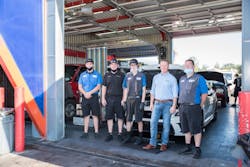Premier Oil Change founder Matt Webb had worked to create a strong shop culture in his business. He honed it from years in a franchised operation and was able to tailor it more as he helped start Premier in 2011.
But changes in the business always challenge a shop’s culture.
“When we went from 20 employees to 45 in a short period of time was kind of a defining moment for the company,” Webb says. “We knew that in a small setting, if you have a few employees, one person can make a huge difference. When you get larger, you have to rely on your systems and your key people.”
That is to say that an owner has less direct oversight of shop culture development as an operation gets larger. But it becomes more important to keep that culture intact. Therein lies the challenge.
Being lackadaisical about the direction of your shop’s culture would be relinquishing a big piece of control over the health of your operation. In the worst cases, a poor shop culture might lead to missed safety checks, poor performance and low employee morale.
In 2018, Chief Executive magazine interviewed top CEOs and business leaders about how they shape company culture. One of the top skills identified in those interviews was the ability to convey core values. And more than formally communicate those values—leaders are expected to be a visible supporter to carry out that vision. In the quick lube world, where operators and employees often enjoy close ties, this presents a great environment for shaping shop culture.
In this article, take a journey through Webb’s shop culture development that got him to that growth point. Let Lube N’ Go President Mark Bochnowski describe how he created a formal culture system to maintain that operational oversight. Finally, Minit Man Oil Change owner Jason Smith describes how a mixture of new and existing strengths can become a potent force in an acquired operation.
If there was a standard operating procedure for shop culture, the leadership component would be at the top of it. The bottom-line rule is this:
“If we’re not defining the culture, it will define itself,” Webb says.
Development
Webb started in 1994 as a lube tech and worked up through the ranks with OilStop. In 2006, he and some business partners purchased a three-bay shop in Eureka, Calif. The franchise had success and added locations.
Eventually, Webb says that his goal was to launch a standalone brand. In 2011, the Premier Oil Change brand was formed, and he had the opportunity to start fresh and foster his own company culture.
For lots of smaller operations, shop culture might be something less formal and more like a loose set of guidelines that owners try to reinforce, little by little, day by day. That’s where Webb stood at the outset of Premier.
“Company culture really begins with defining what your core values are,” he says. “And I think in 2011, when we started Premier, I think we knew what our core values were but we never really put them on paper.”
Turn attitudes into actions.
Quick lube operators are well-practiced in laying out detailed operational processes that govern quality control during work. Think of a set of core values as a moral operating manual.
“I think once you establish your core values, it brings your focus clearer in the direction that your company is going,” Webb says.
Don’t discount the power of your mission statement or core values being conveyed in a catchy or memorable way. This only helps to hold those ideas in your mind and in your team members’ minds. In Premier’s case, the core values were created by turning the brand name into an acronym. Each letter represents a value.
With a mission or set of values as a foundation, culture begins to take shape around that. Whether you’re setting shop rules, hiring new employees or disciplining, the foundation should back up your decisions in those circumstances.
But translating broad values into everyday actions isn’t always easy. For Bochnowski, who is the third-generation operator of the Texas-based Lube N’ Go, it’s best to put yourself in others’ shoes.
“I think it’s important to first consider how you’d like to be treated as both an employee and a customer,” he says. “Once you visualize how all those moving pieces work together, you can begin to implement policies, procedure and training to meet those goals. You have to be an active part of the process daily.”
Reinforcement
What’s the benefit to formalizing a process or value set and committing it to paper?
One thing that Webb found is that it helps to hold an entire team accountable to that system.
“A stronger, higher level of commitment from staff,” he says. “And there’s a saying that goes, ‘the goal is to get everyone in the boat rowing the same direction,’ and I think establishing culture that’s based on the core values kind of helps align that emotion.”
With time, operators get more adept in training those values in the workplace. Just like the mission statement and core principles, it doesn’t hurt to formalize that into a system. A branded training program might be more common in larger organizations, but any size shop can implement it.
That way, training on the physical operation process can more easily incorporate intangible values.
“We’ve implemented the Lube N’ Go Ambassador Program, which is an intensive training and certification course based around policy and procedure—why it’s important and how it directly affects their ability to be successful,” Bochnowski says.
That program is capped with a segment on honesty and sincerity, and Bochnowski leads it himself. He says it gives him that opportunity to reinforce the company values from a leadership position.
Webb’s shops employ a similar strategy: Weave together operational and emotional training so that staff members don’t fall out of practice with either category.
“We do weekly training topics that are distributed to all our stores that the staff and managers read and talk about,” he says. “We continually emphasize the culture building components of our missions as well as our core values. And it’s important to keep those front and center, top of mind.”
It should become apparent that while training is a way to reinforce shop culture, it’s also a reflection of those core values that are embedded into the PREMIER acronym. Training strengthens relationships within the organization. It helps the shops be more proficient in their work. It serves as the set of guidelines for coworkers to strive toward when no one is looking—that’s integrity.
“Holding each other accountable to living those things,” Webb says. “If we say that we have integrity but we don't, then everything kind of goes out the window.”
Carry forward styles that work.
But what if an operator is acquiring a shop that already has a strong culture in place? That happens often in this industry.
That takes a hybrid approach. To keep things running smoothly, the new operator should instill some of their top-level values and operations while respecting what has been built there.
That was the case for Smith, whose company took over the Minit Man Oil Change chain in the Corpus Christi, Texas, area in 2017. With prior experience in quick lubes, Smith and his team had a process in place. But they also found out that their acquisition had a lot of experience to draw from.
“We brought what we knew from running an express lube for 25 years and took it to the stores down there,” Smith says. “They were already giving them great customer service. They had managers who had been with them, some of them for 20 years.”
Smith recognized the strong leadership aspect onsite in those shops. He says that his company brought some more regimented policies and procedures to the operation. But a lot of the soft skills were on the right track.
“Their speed of service was phenomenal. The attitude from technicians on was fantastic, and it probably goes back to the managers who had been there 10 to 20 years,” he says.
Growth
As the Premier brand grew, Webb and his leadership team came to a pivotal transition for the company. Around 2016, the network grew by a couple stores. What was previously manageable through a small leadership team suddenly became a little tougher to oversee.
That was the point that Webb’s culture had its biggest challenge yet. It’s not that the operation was in a dire state. Rather, he anticipated that a bigger oversight structure would need to be developed.
“At that point, it was clear that we weren’t failing, but we didn’t have the system to support the culture,” he says.
In larger operations, it becomes more important to have managers who can fulfill your leadership by proxy. Webb says the company wasn’t failing, but he felt the forces tipping away from control over the company culture as it got larger. That’s when he really started focusing on culture training and development.
“We started focusing on, ‘OK, what does that mean? How do we define that culture?’” he says.
Development is key to shop culture, because the operations are dynamic. People move in and out and businesses experience different stressors. Shops working to get through the COVID-19 pandemic were certainly in a better place if they had strong cultures in place. But an event of that magnitude could also cause change in some aspect.
Culture isn’t static. Webb has been contemplating it for more than a decade.
“Can you change your culture over night? I'm sure you could, but it's more of a slower, more methodical process that needs to be followed,” he says.
Make short-term choices to reach long-term goals.
In that set of CEO interviews done by Chief Executive, one leader emphasized the dual-vision nature of being at the top of an organization. Bob Leduc, who was at the time CEO of Pratt and Whitney, said that his most important responsibility was setting the visions for both a long-term mission and near-term objectives that get the organization on the right track.
The short-term coaching can sound exhausting. Leduc said that he makes a point to reinforce expectations “constantly” in large forums, conferences, big and small meetings and in individual interactions. He asks specific, pointed questions about how employees are working to foster the company’s “desired culture.”
That granular-level reinforcement can sound like a lot, but it’s key to maintaining oversight and being able to adapt to the development of the organization and its culture.
At Lube N’ Go, Bochnowski says that the long-term, core mission behind their company culture remains relatively the same, while they have evolved the way they accomplish it. One part is a long-term goal, while the second part has to do with the daily tasks needed to reach it.
“I have always had a plan about shop culture, and it is centered around the policies and procedures that we put in place,” he says. “We work hard to maintain the culture in our interactions daily through teamwork and dedication to the core of who we are. It’s a working strategy that requires regular evaluation and training as well as great feedback to all members of the team.”
You can also think of the difference between core values and shop culture as a long term-short term dichotomy. The first step in the process was to create a set of core values that act as the long-term bedrock for the business. On your way to fully realizing those values, shop culture is shaped in the meantime and is represented by the choices that the people in the organization make every day.
“We are going to keep refining it and adding to it,” Webb says.
About the Author
Matt Hudson
Content Director
Matt Hudson is the former content director for National Oil and Lube News.

